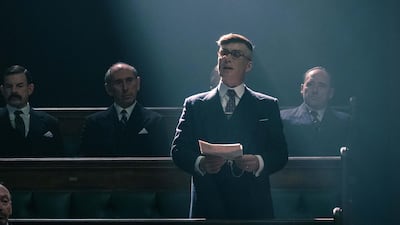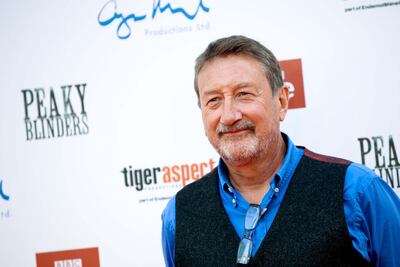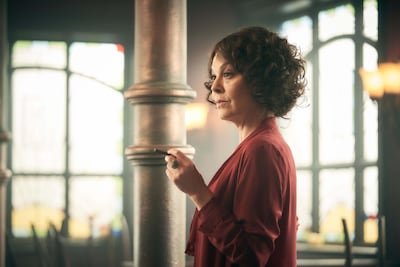Peaky Blinders creator Steven Knight is trying to put his finger on why his historical gangster drama, "this unfashionable, Birmingham-set thing" that had always been in his mind, has struck such a chord around the world. Simply being able to make his pet project in the first place was a small victory – now there are Peaky Blinders-themed bars and weddings. A ballet and musical are in development, David Beckham has designed his own clothing line inspired by the show and it's estimated Birmingham has attracted a 26 per cent rise in visitors since the first series, mainly from the US. "Astonishing," says Knight with a smile, as its fifth season begins on Netflix this week.
"We've always had great directors and brilliant performances, and that gives us a confidence and energy to try the things we want to do," he continues. "Peaky Blinders is about family and breaking the rules, which is often popular. But I've always wanted to reflect the reality of people's lives. OK, yours might not be as dramatic and violent and scary as the things that happen in Peaky Blinders, but we all have emotions, barriers, relationships." The new series once again explores the interwar period of the early 20th century. Tommy Shelby, as the cunning leader of the Peaky Blinders gang, is now part of the establishment as a Member of Parliament for Small Heath, Birmingham. But Cillian Murphy's character is not about to stop fighting; as the Wall Street Crash bites these are brutal times, with nationalism, populism and racism sweeping across the western world. Knight says the connections between the backdrop to the world of the Peakys and the political situation today are "spooky".
“Fortuitous for me, terrible for the world,” he jokes.
But what's so crucial to Peaky Blinders's success is that Knight never lays the history on too thick. Winston Churchill and far right leader Oswald Mosley appear in the drama, but only to serve the story, not overwhelm it.
"I wouldn't have someone walking on as Hitler," he confirms. "What I wanted to reflect is that in the early 1930s in the UK, a fascist rally could attract 100,000 people, with others queuing to get in. It's more the mood of that I try to explore; with Peaky Blinders I'm always trying to reflect what was happening in history via the people in Birmingham who live around the Shelbys."
And in the end, it's what makes the Shelbys tick that makes Peaky Blinders such compelling viewing. Helen McCrory, who plays the matriarchal Aunt Polly, Tommy's sounding board and touchstone, thinks there's a genuine discussion to be had about whether he's actually trying to be good. "What's the next thing that could even be worse than murdering, thieving, blackmailing? Oh, he's going to become a politician! It's a great punchline – quite witty, I think. But can a bad person do good acts? Or do they automatically become bad acts because a gangster did them? I think this series grapples quite a lot with that, and it's up to the audience to work out how they feel about Tommy." One thing's for sure, the heightened violence in Peaky Blinders has certainly not changed. As a BBC co-production, that's often led to the accusation that young people will see these gratuitous scenes as normal, amusing even. Knight is unapologetic.
"Look, whenever there's an act of violence in Peaky Blinders, that person stays hurt for two or three episodes. They are injured, and you see that this brief moment of violence leads to a consequence. An act of violence causes an act of revenge somewhere down the line. What I think is dangerous is when people see violence that is routine and inconsequential. Hopefully people care about our characters – certainly I hope because of that, the violence is more of a deterrent."
And in season five, you certainly care about Tommy Shelby – there's a definite sense that he's thawing out, yet haunted by the things he's done in the past. Without giving too much away, by the end of this season, which has just finished its run in the UK on prime-time BBC, Tommy is in the throes of a full-on existential crisis.
It's an irresistible performance from Murphy, not least because it's underpinned by the context of the entire show; set in the years after the First World War, during which Tommy saw thousands of people killed every hour at the request of commanding officers. "That's where his moral compass got destroyed and now he's basically trying to piece it together," Knight says.
In fact, that's the Peakys journey in microcosm. The idea was always to take a character who was damaged by the war, who feels nothing and has no connection with other human beings, and make him human again by the end of the saga. Knight is plotting towards the end of series seven, with the idea that it will close with the first Birmingham air-raid siren of the Second World War … and then, perhaps, shoot a film.
"When the energy behind this is so strong it seems a shame to stop it, but I want to get to the destination that I had from the very beginning of series one, and then maybe look at what we do next," he says.
Whatever it is, by that point Peaky Blinders will surely have cemented its place as one of the 21st century's very best television dramas.
Season five of Peaky Blinders is on Netflix from Friday, October 4



